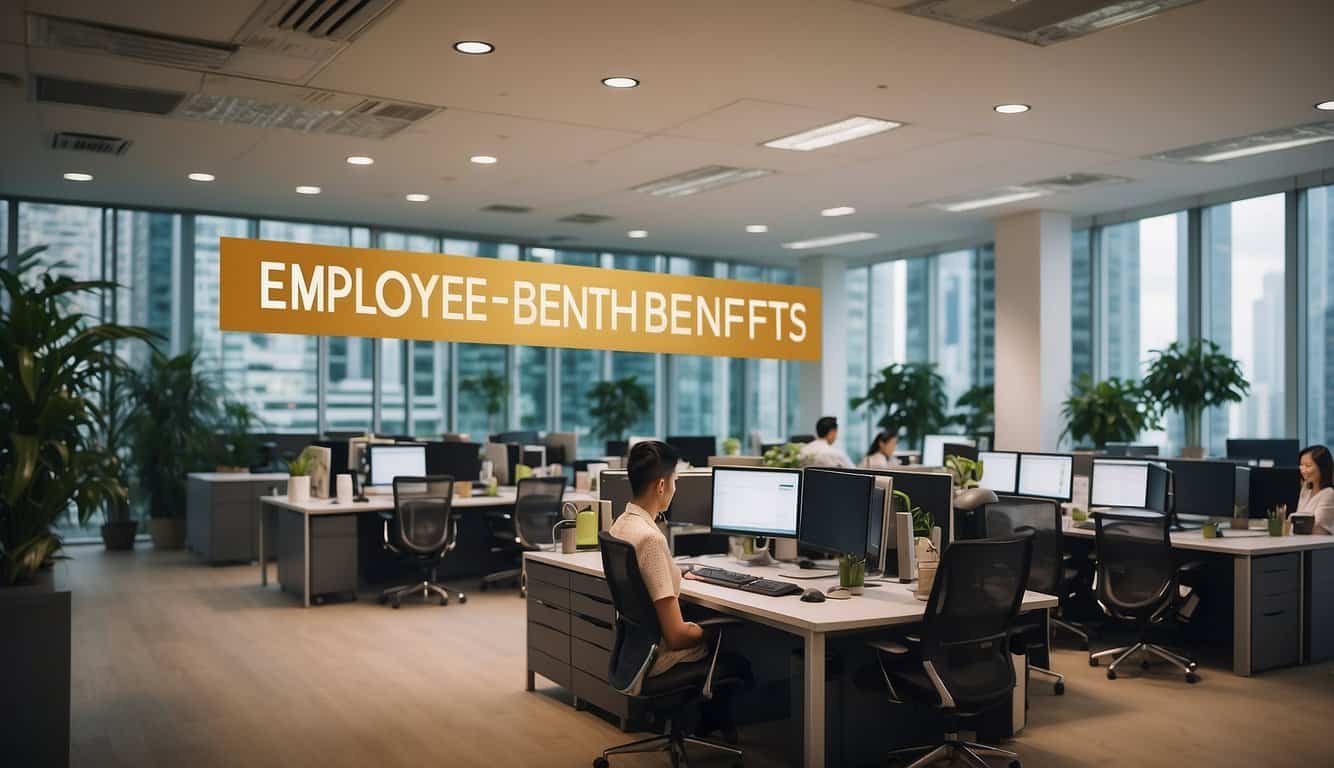Motivate Your Team With Great Employee Benefits
Employee benefits in Singapore are an essential aspect of the employment landscape, offering a wide range of advantages to employees. From comprehensive healthcare coverage to retirement savings plans, these benefits play a crucial role in attracting and retaining top talent in the competitive job market. Understanding the intricacies of employee benefits in Singapore is vital for both employers and employees to ensure a mutually beneficial working relationship.

Employee leave entitlements are a key component of the benefits package in Singapore, encompassing annual leave, sick leave, and childcare leave, among others. These provisions are designed to support employees in achieving a healthy work-life balance and addressing personal and family needs. Additionally, various additional perks and allowances, such as housing and transportation benefits, may be offered by employers to enhance the overall employee experience and well-being.
Key Takeaways
- Employee benefits in Singapore are diverse and contribute significantly to the overall job satisfaction and retention of employees.
- Understanding the intricacies of employee leave entitlements and additional perks is crucial for both employers and employees in Singapore.
- The comprehensive benefits package in Singapore reflects the commitment to employee well-being and work-life balance.
Understanding Employee Benefits in Singapore

If you’re an employee in Singapore, you are entitled to a range of benefits that can help improve your quality of life. Employers in Singapore are required to provide mandatory benefits to their employees, but many also offer non-mandatory benefits to stay competitive in the job market.
Mandatory Employee Benefits in Singapore
As per the Employment Act, employers in Singapore are required to provide mandatory benefits to their employees. These benefits include:
- Annual Leave: Employees are entitled to at least seven days of paid annual leave after working for the employer for three months.
- Sick Leave: Employees are entitled to at least 14 days of paid sick leave per year.
- Public Holidays: Employees are entitled to paid public holidays.
- Hospitalization Leave: Employees are entitled to paid hospitalization leave if they have worked for the employer for at least three months.
- Maternity Leave: Female employees are entitled to 16 weeks of paid maternity leave if they have worked for the employer for at least three months.
- Paternity Leave: Male employees are entitled to two weeks of paid paternity leave if they have worked for the employer for at least three months.
- Work Injury Compensation: Employers are required to provide work injury compensation insurance to their employees.
- Central Provident Fund (CPF) Contribution: Employers are required to contribute to their employees’ CPF accounts on a monthly basis.
Non-Mandatory Benefits for Competitive Edge
To stay competitive in the job market, many employers in Singapore offer non-mandatory benefits to their employees. These benefits can include:
- Gym Memberships: Some employers offer gym memberships to their employees as part of their benefits package.
- Dental Insurance: Some employers offer dental insurance to their employees as part of their benefits package.
- Medical Insurance Benefits: Some employers offer medical insurance benefits to their employees as part of their benefits package.
- Flexible Working: Some employers offer flexible working arrangements to their employees to help them achieve a better work-life balance.
- Employee Assistance Program: Some employers offer employee assistance programs to their employees to help them deal with personal or work-related issues.
Insurance Coverage and Health Benefits
In addition to the mandatory and non-mandatory benefits, many employers in Singapore also offer insurance coverage and health benefits to their employees. These benefits can include:
- Health Insurance: Some employers offer health insurance to their employees as part of their benefits package.
- Medisave: Employers are required to contribute to their employees’ Medisave accounts on a monthly basis.
- Hospitalization Leave: Employees are entitled to paid hospitalization leave if they have worked for the employer for at least three months.
Retirement and CPF Contributions
To help employees save for retirement, employers in Singapore are required to contribute to their employees’ CPF accounts on a monthly basis. The amount of CPF contribution depends on the employee’s age and salary.
Overall, employee benefits in Singapore are designed to help employees achieve a better work-life balance and improve their quality of life. As an employee, it’s important to understand your entitlements and options when it comes to employee benefits.
Employee Leave Entitlements

As an employee in Singapore, you are entitled to various types of leave, including annual and public holidays, family and parental leaves, and medical and hospitalisation leaves.
Annual and Public Holidays
According to the Ministry of Manpower [1], you are entitled to paid annual leave if you have worked for your employer for at least 3 months. Your annual leave entitlement depends on how many years of service you have with your employer. You are also entitled to paid public holidays, which are determined by the government.
Family and Parental Leaves
If you are planning to start a family or have a child, you may be entitled to family and parental leaves. The Employment Act in Singapore provides for maternity leave, paternity leave, and childcare leave. According to Singapore Legal Advice [2], female employees are entitled to 16 weeks of paid maternity leave, while male employees are entitled to 2 weeks of paid paternity leave.
Medical and Hospitalisation Leaves
If you fall ill or need to be hospitalised, you may be entitled to medical and hospitalisation leaves. According to 3E Accounting [3], employees are entitled to sick leave and hospitalisation leave, which are paid and unpaid depending on the length of service and the type of leave taken.
In conclusion, as an employee in Singapore, you are entitled to various types of leave, including annual and public holidays, family and parental leaves, and medical and hospitalisation leaves. Make sure to familiarise yourself with your leave entitlements and take advantage of them when necessary.
[1] https://www.mom.gov.sg/employment-practices/leave/annual-leave
[2] https://singaporelegaladvice.com/law-articles/company-leave-entitlements-singapore/
[3] https://www.3ecpa.com.sg/resources/employee-benefits/annual-leave-in-singapore-for-employees/
Additional Perks and Allowances

As an employee in Singapore, you can expect to receive additional perks and allowances on top of your regular salary and benefits package. These perks and allowances can help to improve your work-life balance, boost your career development, and enhance your overall well-being.
Education and Training Opportunities
Many employers in Singapore offer education and training opportunities to their employees. This can include on-the-job training, professional development courses, and even financial support for further education. Taking advantage of these opportunities can help you to develop new skills, advance your career, and increase your earning potential.
Relocation and Housing Benefits
If you are relocating to Singapore for work, your employer may offer a relocation package to help cover the costs of moving and settling in. This can include assistance with finding housing, paying utility bills, and even covering school fees for your children. Some employers may also offer housing benefits to employees who live in expensive areas or who have long commutes.
Lifestyle and Wellness Programs
Maintaining a healthy work-life balance is important for your overall well-being. Many employers in Singapore recognise this and offer lifestyle and wellness programs to their employees. This can include gym memberships, health screenings, and even dental insurance. These programs can help you to stay healthy and happy both in and out of the office.
Workplace Flexibility Options
Flexible working arrangements are becoming increasingly popular in Singapore, especially in light of the Covid-19 pandemic. Many employers now offer remote work options, flexible working hours, and even part-time or job-sharing roles. This can help you to achieve a better work-life balance and manage your responsibilities outside of work.
In addition to your regular salary and benefits package, these additional perks and allowances can help to enhance your overall work experience in Singapore. Be sure to check with your employer to see what options are available to you and take advantage of them to improve your work-life balance, advance your career, and enhance your well-being.
Employment Types and Considerations
When it comes to employment in Singapore, there are several considerations you should keep in mind. Understanding the different types of employment available can help you make informed decisions about your career and ensure you receive the right benefits.
Full-Time vs Part-Time Employment
One of the most significant differences between full-time and part-time employment in Singapore is the number of working hours. Full-time employees typically work 44 hours a week, while part-time employees work fewer hours. Full-time employees are also entitled to more benefits, such as paid leave and medical insurance.
Contract and Temporary Positions
Contract and temporary positions are common in Singapore, particularly in industries such as construction and hospitality. These positions are typically for a fixed period and offer fewer benefits than full-time positions. However, they can be an excellent way to gain experience and build your skills.
Special Categories of Employment
There are several special categories of employment in Singapore, including domestic workers, seamen, and foreign employees. These categories have their own set of regulations and requirements, so it’s essential to understand them before accepting a position.
When considering employment in Singapore, it’s important to understand the standard employment contract and the benefits it provides. This contract outlines the terms of your employment, including your salary, work hours, and position. It’s also important to understand your rights as an employee, including your entitlement to paid leave and medical insurance.
Whether you’re a full-time or part-time worker, a contract or temporary employee, or fall into one of the special categories of employment, understanding your rights and benefits is crucial. By doing so, you can ensure you receive fair treatment and make informed decisions about your career.
Regulatory Compliance and Employment Law
As an employer in Singapore, it is essential to comply with the relevant regulations and employment laws to avoid legal issues and penalties. In this section, we will discuss the key regulations and laws that employers should adhere to.
Adherence to the Employment Act
The Employment Act is a crucial regulation that outlines the basic terms and conditions of employment in Singapore. As an employer, you must comply with the act’s provisions, including the minimum employment age, working hours, overtime pay, and annual leave entitlements. It is essential to note that the act applies to all employees, regardless of their salary or job position.
Work Permit and Foreign Employee Regulations
If you plan to hire foreign employees, you must comply with the regulations set out by the Ministry of Manpower (MOM). You must obtain the necessary work permits and ensure that the employees meet the requirements for working in Singapore. Additionally, you must comply with the regulations concerning the employment of foreign employees, such as the maximum quota and levies.
Employee Benefits for Singapore Citizens
As an employer in Singapore, you are required to provide mandatory employee benefits to your Singaporean employees. These benefits include Central Provident Fund (CPF) contributions, which are mandatory for all employees aged below 55 years. CPF is a savings scheme that helps Singaporeans save for retirement, healthcare, and housing. Employers are required to contribute a percentage of the employee’s monthly salary to their CPF accounts.
In conclusion, complying with the relevant regulations and employment laws in Singapore is crucial for employers. Non-compliant employers may face legal issues and penalties. Therefore, it is essential to ensure that you are aware of the regulations and comply with them at all times.
Financial Aspects of Employee Benefits

As an employee in Singapore, you enjoy a range of financial benefits that are designed to help you manage your budget and make the most of your salary. In this section, we’ll take a closer look at some of the key financial aspects of employee benefits, including salary and bonus structures, CPF contributions, and reimbursement policies for work-related expenses.
Salary and Bonus Structures
When it comes to remuneration, employers in Singapore are generally quite competitive, offering a range of salary and bonus structures to attract and retain top talent. In addition to a base salary, many companies offer annual bonuses, which can be a significant portion of your total compensation package.
CPF Contributions and Budget Impact
One important financial aspect of employee benefits in Singapore is the Central Provident Fund (CPF). Employers are required to contribute a percentage of your salary to your CPF account, which is capped at a certain amount. These contributions can have a significant impact on your budget, as they are deducted automatically from your salary.
Reimbursement Policies for Work-Related Expenses
If you need to travel for work or incur other work-related expenses, your employer may offer reimbursement policies to help cover these costs. For example, you may be reimbursed for the cost of flights, accommodation, and meals when travelling for work. It’s important to understand your company’s reimbursement policies and procedures, as well as any caps or limits on the amount you can claim each year.
Overall, employee benefits in Singapore are designed to help you manage your budget and make the most of your salary. By understanding the financial aspects of these benefits, you can make informed decisions about your compensation package and ensure that you are getting the most value from your employment.
Frequently Asked Questions
What perks can I expect from top-tier companies in Singapore?
Top-tier companies in Singapore offer a range of perks to attract and retain top talent. These perks can include generous health and dental insurance, flexible work arrangements, wellness programs, and retirement benefits. Some companies also offer tuition reimbursement, paid time off for volunteering, and even on-site childcare. Keep in mind that the specific perks offered will vary by company, so be sure to research the benefits package of any potential employer before accepting a job offer.
How might bonuses enhance my total compensation package?
Bonuses can be a valuable addition to your total compensation package, providing an extra incentive to work hard and meet performance goals. In Singapore, bonuses are typically paid out once or twice a year and can range from a few weeks’ worth of salary to several months’ worth. Some companies also offer profit sharing or stock options as part of their bonus structure. Keep in mind that bonuses are typically discretionary and not guaranteed, so be sure to clarify the terms of any bonus scheme with your employer.
Are employers in Singapore required to provide medical insurance?
While employers in Singapore are not required by law to provide medical insurance, many do offer it as part of their benefits package. This can include coverage for hospitalization, specialist consultations, and prescription medication. Some companies also offer dental and vision insurance as part of their medical benefits package.
What kind of medical benefits do Singaporean companies typically offer?
In addition to medical insurance, Singaporean companies may offer a range of other medical benefits to their employees. This can include health screenings, wellness programs, and access to on-site clinics or medical professionals. Some companies also offer additional benefits such as gym memberships or discounts on health-related products and services.
Can you tell me about the flexible benefits schemes available in Singapore?
Flexible benefits schemes allow employees to choose from a range of benefits to create a customized benefits package that meets their individual needs. In Singapore, these schemes may include options such as additional vacation time, increased retirement contributions, or additional health insurance coverage. Keep in mind that not all companies offer flexible benefits schemes, so be sure to research the benefits package of any potential employer before accepting a job offer.
What should I look for in a job to ensure a comprehensive benefits package?
When evaluating job opportunities in Singapore, it’s important to consider the overall benefits package in addition to salary and job responsibilities. Look for companies that offer comprehensive medical insurance, retirement benefits, and flexible work arrangements. You may also want to consider companies that offer additional perks such as tuition reimbursement or on-site childcare. Be sure to research the benefits package of any potential employer and ask questions during the interview process to ensure that the package meets your needs and expectations.




